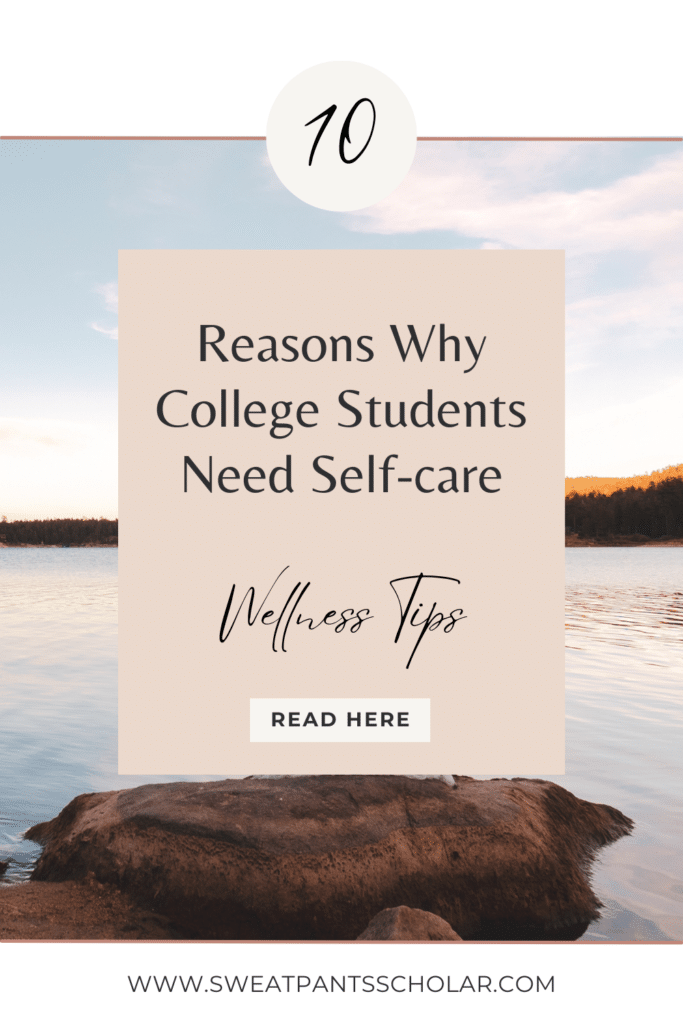Self-care, self-care, self-care. We all hear the word self-care. It’s not new, and it’s definitely not going to be the last time you hear about it. My main mission here is to explain why self-care is important to you as a college student and why you should take it as seriously as you take your exams and classes.

What is Self-Care?
So, what is self-care? According to Google, in simple terms, self-care is anything you do to keep yourself mentally, emotionally, physically, socially, and spiritually healthy. Let’s add financially healthy to that list because financial stability is also crucial to your overall well-being. Self-care is important for everyone, not just college students—moms, dads, kids—everyone needs to practice self-care to stay healthy in every aspect of life.
Self-care can be as simple as taking a few minutes each day to relax, or as comprehensive as creating a detailed self-care routine that includes multiple activities aimed at improving different areas of your life. It’s about making a conscious effort to take care of yourself, ensuring you have the energy and mental clarity to handle the demands of college life.

Why College Students Need Self-Care
As a college student, you’re juggling so many things—classes, assignments, jobs, and household responsibilities. The stress is real, and burnout is common. Instead of just complaining about it, let’s look at self-care and wellness as a solution. Here are 10 raw reasons why self-care is essential for college students:
- Combat Burnout: Burnout is more than just being tired; it’s a state of emotional, physical, and mental exhaustion. Self-care practices like getting enough sleep, taking breaks, and engaging in activities you love can help prevent burnout. For instance, scheduling a self-care day routine once a week where you disconnect from academic pressures and focus on activities that rejuvenate you can be incredibly beneficial. “Self-care is not a luxury; it’s a necessity for avoiding burnout.”
- Improve Mental Health: College life is stressful. Regular self-care routines like meditation, journaling, or talking to a friend can significantly improve your mental health, helping you stay balanced and positive. It’s about creating small pockets of peace in your day. For example, starting your morning with a 10-minute mindfulness session can set a positive tone for the rest of the day. “Your mental health is just as important as your physical health.”
- Boost Physical Health: Exercise, proper nutrition, and adequate rest are vital self-care practices. These not only keep you physically healthy but also enhance your mood and energy levels, making it easier to tackle academic challenges. Incorporating simple self-care day ideas like a walk in the park, a home workout, or cooking a healthy meal can make a huge difference. “Taking care of your body is an essential part of self-care.”
- Enhance Academic Performance: When you’re well-rested, emotionally balanced, and physically healthy, you perform better academically. Self-care helps you stay focused and improves your cognitive functions, leading to better grades and overall academic success. Implementing a self-care routine that includes study breaks, proper sleep, and balanced meals can enhance your academic performance. “Self-care is the foundation for academic success.”
- Develop Better Coping Mechanisms: Self-care teaches you how to handle stress and adversity better. By incorporating activities that help you relax and unwind, you build resilience and find healthier ways to cope with life’s challenges. For example, finding a creative outlet like painting, writing, or playing an instrument can be a therapeutic way to manage stress. “Developing healthy coping mechanisms through self-care is crucial.”
- Strengthen Social Connections: Engaging in social activities and maintaining friendships is a form of self-care. These connections provide support, reduce feelings of loneliness, and contribute to your overall happiness and well-being. Regularly scheduling time with friends or joining social clubs can help you feel connected and supported. “Strong social connections are a vital part of self-care.”
- Promote Financial Stability: Financial stress is a major issue for many college students. Practicing self-care by budgeting, saving, and managing your finances can reduce this stress and promote a sense of control and stability. Setting aside time each week to review your finances and plan your spending is a form of self-care that can alleviate financial worries. “Financial health is an essential component of self-care.”
- Increase Self-Awareness: Self-care involves tuning into your needs and desires. This increased self-awareness can help you make better decisions, set boundaries, and prioritize what truly matters in your life. Regular reflection through journaling or meditation can enhance your self-awareness and personal growth. “Self-awareness is the key to effective self-care.”
- Encourage Personal Growth: Self-care is not just about pampering yourself; it’s also about personal development. Engaging in activities like reading, learning new skills, or pursuing hobbies can foster personal growth and fulfillment. Dedicate time to activities that challenge you and help you grow. “Personal growth is a rewarding aspect of self-care.”
- Foster a Positive Outlook: Regular self-care practices can help you maintain a positive outlook on life. Whether it’s through gratitude journaling, spending time in nature, or practicing mindfulness, these activities help you stay optimistic and motivated. Start or end your day with a gratitude journal to remind yourself of the positive aspects of your life. “A positive outlook is a natural outcome of consistent self-care.”
Practical Tips for Incorporating Self-Care
- Create a Self-Care Plan: Write down activities that make you feel good and schedule them into your week.
- Start Small: Incorporate small self-care practices into your daily routine, like a 5-minute meditation or a short walk.
- Listen to Your Body: Pay attention to what your body needs, whether it’s rest, nutrition, or physical activity.
- Set Boundaries: Learn to say no to things that drain your energy and prioritize activities that replenish you.
- Seek Support: Don’t hesitate to reach out to friends, family, or professionals when you need help.
Related Posts:
- 20 Invigorating Self-Care Activities for Busy College Students
- 5 Eye-Opening Financial Life Hacks for College Students in 2024
Conclusion
In conclusion, self-care and wellness can be great solutions to deal with college stress and burnout. However, it’s important to remember that self-care is not a one-size-fits-all approach. Everyone’s self-care routine is different because we all enjoy different activities. While this blog provides general advice, it is not medical advice. If you suffer from clinical depression or any severe mental health issues, please consult a licensed professional.
Take care of yourself, because you deserve it.
Pin this post if you found it helpful!




